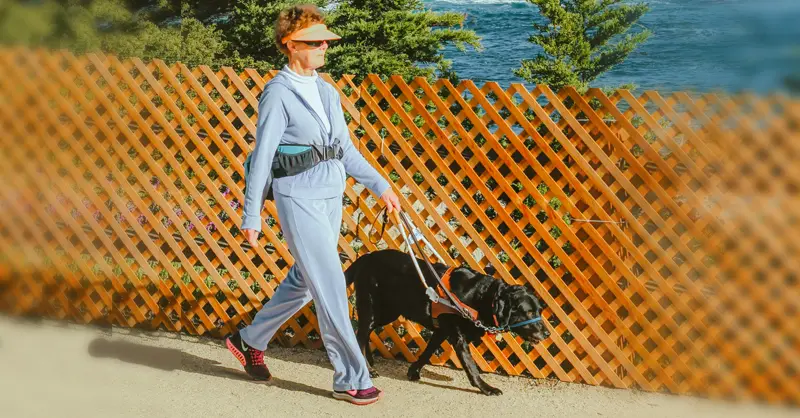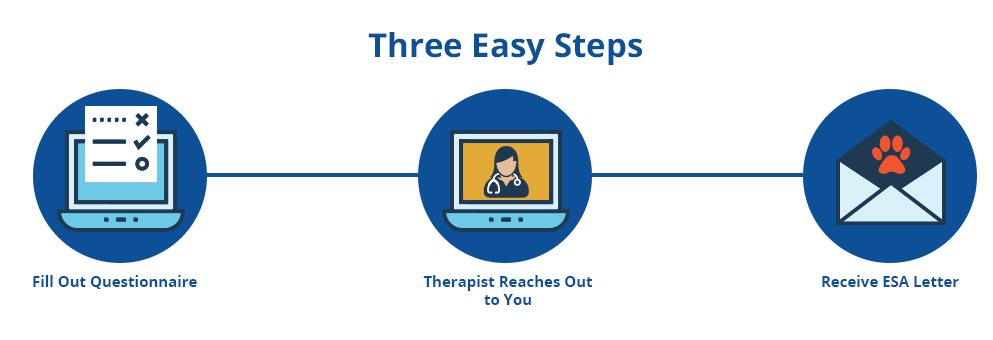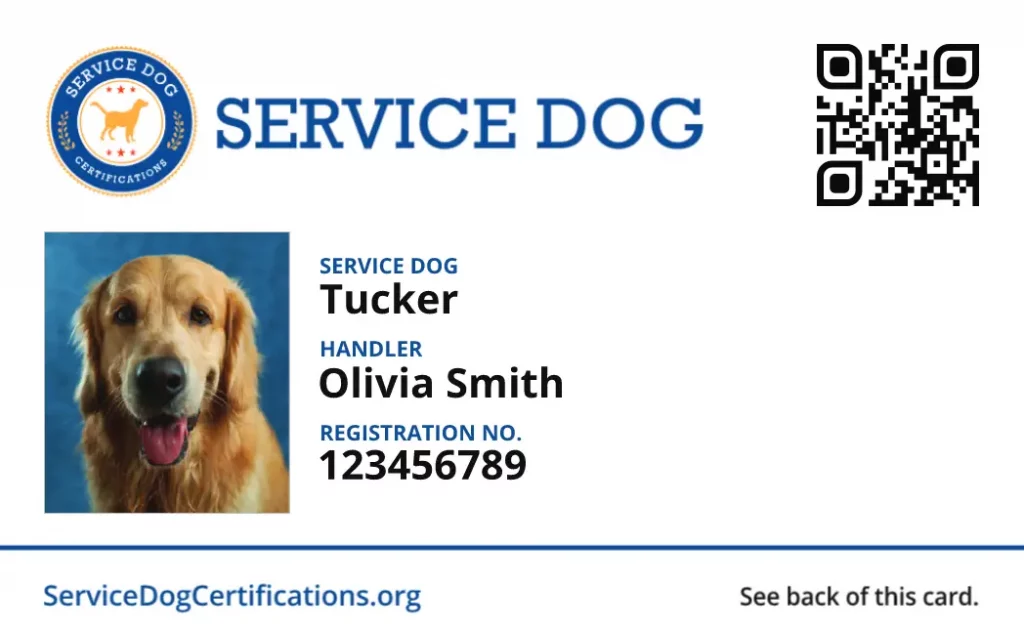Home Page › Blog › California Service Dog Requirements
California Service Dog Requirements

California allows people with disabilities to live, travel, and go about their daily lives in the presence of a service dog. Service dogs are afforded certain rights in the State of California that allow them to access public spaces that normally don’t allow pets.
Californians are protected by both federal and state laws, including under the Americans with Disabilities Act (ADA) as well as California’s Unruh Act (Civil Code, sections 51–51.2) and Disabled Persons Act (Civil Code, sections 54–55.32).
Read on for more information on California Service Dog requirements and regulations.
Definition of a service dog
Service Dog: Any canine trained to perform a disability-specific task for a person with a physical or psychiatric disability.
Service dogs used for mental health conditions are known as Psychiatric Service Dogs.
What is a disability: For legal purposes, disability is defined as a physical or mental impairment that substantially limits a major life activity (such as the ability to work, socialize, or attend school). Physical disabilities include health issues like limited mobility, visual impairment, seizures, and hearing loss. Qualifying psychiatric conditions include debilitating depression, chronic anxiety, PTSD, autism, and learning disabilities, among others.
How is a service dog trained?
To be considered a service animal, a dog must be individually trained to perform a job or task-specific to the handler’s disability.
Federal vs California rules: One difference between California’s rules and the ADA is that service dogs in training are not covered under the ADA. However, under the California Disabled Persons Act, individuals who train service dogs can bring their animals to any public place in order to train the dog and provide a disability-related service.
Who can train a dog: Dogs can be trained by the person with the disability, by a professional trainer, or with the help of a training organization. Note that in California, it is perfectly acceptable for a handler to train a service dog on their own.
Identification requirements for service dogs in California
Visible identification: Most service dog owners use service dog paraphernalia like ID cards, vests, tags, and certificates to signal to others in public that their dog is special. It is not mandatory either under California or federal rules to have an identification card or vest on your Service Dog, but handlers frequently use them for personal convenience. These items can prevent intrusive inquiries and unwanted interaction with the service animal while on duty.
Disability verification: Staff at venues and landlords cannot demand documentation as a condition of entry. In California, they can ask two questions to validate whether you have a service dog (and only if the disability is not obvious):
1. Is the animal a service dog required for a disability?
2. What work or task has the service dog been trained to perform?
Service dog registration in California
California does not require the registration of service dogs. There may be registration requirements that generally apply to all dogs that reside in your area, but they are not service-dog specific. Service dog owners, however, choose to voluntarily register their dogs for several reasons.
What it’s for: Registering a service dog with a service like Service Dog Certifications enters the dog’s information into a searchable database linked to an ID card. The ID card can be used as one way to signal to others that you own a service dog or be presented when third parties unaware of service dog verification rules continually insist on seeing documentation.
Psychiatric service dog requirements
Psychiatric service dogs are recognized as service dogs in California with all the same rights and benefits of ownership.
Psychiatric service dogs are still not well appreciated by the general public but are a growing category of assistance animals.
California considers the following as psychiatric disabilities if they substantially limit a major life activity:
- Post-Traumatic Stress Disorder
- Anxiety Disorders
- Depression
- Obsessive-Compulsive Disorders
- Personality Disorders
- Schizophrenia and Schizoaffective Disorder
- ADHD
- Autism
Psychiatric service dogs can perform an amazing number of tasks, including:
- Deep pressure therapy
- Reminding the owner to take medication
- Posting and watching the owner’s back in open areas
- Tactile stimulation
- Alerting the owner to oncoming threats or episodes
- Disrupting repetitive self-destructive behaviors
Service dog vs emotional support dog in California
California also recognizes emotional support animals as a type of assistance animal. An emotional support animal (ESA) alleviates symptoms of a mental or emotional health condition.
SD vs ESA: There are major differences between ESAs and service dogs.
- ESAs do not require any specialized training.
- ESAs are protected under the Fair Housing Act, not the ADA, so the benefits extend primarily to housing rights and do not come with public access rights.
- While service dogs can only be dogs, ESAs can be dogs, cats, birds, gerbils, fish, turtles, and other small household pets.
To qualify for an emotional support animal in California, you need an ESA letter from a California-licensed mental health professional. See if you qualify for an emotional support animal letter by completing the online questionnaire below.

You and your service dog in California
Service Dog handlers in California have generous rights. These include:
- Public access (venues, outdoor areas, etc.)
- Access to public transportation
- Access to aviation (including in the cabin on airplanes)
Having a service dog in California is a major responsibility. Properly training a service dog can be challenging, and service dog owners are expected to have their animals under control at all times. Of course, as a reminder, California law prohibits misrepresenting a pet dog as a service dog.
As a service dog owner, it’s important to be aware of your rights and how to conduct yourself during proper service dog verification requests by third parties. Registrations, certificates, ID cards, tags, and vests can’t replace these procedures, but they can help ease the process and give the public an easy way to recognize your companion as a service dog.
About the Author: The writing team at Service Dog Certifications is made up of folks who really know their stuff when it comes to disability laws and assistance animals. Many of our writers and editors have service dogs themselves and share insights from their own experiences. All of us have a passion for disability rights and animals.
135 comments
Leave a Reply Cancel reply
Latest Posts

Ohio Service Dog Requirements
You can bring a service dog almost anywhere where pets aren’t allowed in Ohio as long as you meet all the necessary requirements. The rights of service dog handlers in the Buckeye State are covered under federal and state laws. This guide will walk you through Ohio’s legal requirements for service dogs. Ohio Health Requirements […]

Read More

How to Bring a Service Dog to Disneyland
Trained service dogs are more than welcome to join their handlers at Disneyland. In this guide, we’ll explain Disneyland’s policies and give practical advice for bringing a service dog to Disneyland for the first time. Disneyland’s Service Dog Policies The Magic Kingdom is happy to welcome trained service dogs across most park locations! They kindly […]

Read More

Can Dogs Eat Tomatoes?
Yes! Dogs can safely enjoy tomatoes, but there are a few risks to be aware of so you can feed your dog responsibly. Fully ripe tomatoes (without the stems and leaves) can actually have nutrients that are good for your pup. Tomatoes have chlorogenic acid, an antioxidant that can have anti-inflammatory effects in cells. They’re […]

Read More









I’ve been working as a Supervisory Correctional Officer since 1994. In 2014 & 2016 I was brutally attacked by inmates that resulted in a mountain of physical damage and what appears to be never ending mental and emotional trauma as well. If that weren’t enough, my 32 year old son suffered a fatal heart attack last week. My only means of coping with life at this point is with the assistance of my German Shepherd. When I am required to travel and spend any time whatsoever away from him, those moments/days are brutal. He is obedient and is in tune with my emotions unlike anyone I know and he makes all the difference how I cope with my day to day obligations. Can I register Maxx as a service dog?
First of all, I am sorry for all you have had to go through. I am a female Combat Veteran, and I have a Service that helps me with my PTSD. You can get on any website and pay for a certificate and a vest that says your dog is a service dog.
I request that you do NOT do that.
There are WAY too many people currently doing that, and then their dogs attack someone that got to close to them, start barking inside a business, whining, crying, growling etc. These are NOT service dogs. An actual service dog has specific training for public access. They have good manners and know how to act. The people who buy a certificate online and a service dog vest and slap it on their dog are the ones who ruin it for everyone out there that have legitimate service dogs.
From your description of your dog, it sounds like he does have a lot of the good qualities needed. Contact a local organization that training service dogs. Ask them to test your dog, and then assist you with any further training he may need. It might be just a few things and nothing more.
I wish you luck Sir. God Bless.
AFTERTHOUGHT!
Also, from what you wrote it sounds like your dog is very bonded to you. I strongly suggest reading the books by Jennifer Arnold about Bond based Training.
My dog is bond based trained, knows his colors, numbers, shapes, etc. He knows only TWO emergency commands and no more. He doesn’t need to be commanded. He takes care of me because he loves me, and I reward him because I love him and not for doing a good thing.
Pretty amazing training technique, and MANY service dog trainers are starting to go towards it. I think its perfect for ANY dog, and if all our dogs were bond based trained, there would be a bunch of almost perfect dogs out there. 🙂
I’m a T5 paraplegic confined to either my hospital bed or my power chair. Would like to know from anyone out there if getting a service dog would help. I want to do this but at the same time I don’t want to make it difficult for the dog.
My dog Archer is a medium Cockapoo about 20 pounds. I am 100% disabled, I live alone. I have history of heart attacks and now diabetic. Archer in his collar pouch carries nitro, aspirin, candy and cell phone for 911 in the event I go down and cant get to my meds or my cell phone. Does this qualify Archer as a service animal?
The dog is doing a service for u that u cannot do for yourself. I think that is the criteria for a genuine service animal
I have social anxiety and depression and I have a chawawa docshon mix and I have issues with jitters and weakness when I am nervous and my dog is very laid back and calm when I holding and massage him it calms would that consider him as a service dog or emotional support dog.
If your dog gives you comfort in times of need, you should talk to your therapist about getting an emotional support animal letter. If your dog fulfills a task that you yourself cannot do when you need it (for example, fetches medication or alerts you of upcoming anxiety attacks), then your dog could become a service dog.
You may find this article on the difference between service dogs and emotional support dogs interesting https://www.servicedogcertifications.org/the-difference-between-a-psychiatric-service-dog-and-an-emotional-support-animal/
Hi I’m in a very unsafe area I have a 2 month old son. I have been followed 3 times to my apartment complex and my maintenance man has walked in my house while I was in the shower with out a work order. I feel very unsafe. I need a dog to let me know if a person walks into my apartment and to keep me safe on the streets. I do not have money to get it trained but is it possible to just get the certification and my landlord not evict me?
you can train a dog, but, it appears you need a protection dog, and not a service dog. Check with places that train protection dogs, sometimes they have a good dog who just did not’ make the cut, and it could be something very minor. Y gangs, so my Dad bought a retired police dog for the purpose of alerting an intruder. He did not make the cut as a police dog because on his test he reacted to a shot being fired. Trust me shots fired around our house all the time and he would move us away from the windows and never reacted badly. Support dogs are for physically impaired. A good dog, who is basically trained and is treated well by his family will protect automatically. do some research and find a good fit for you, rescue a good dog.
All service animals MUST be trained to perform a service or task to assist a disabled person. Any dog that does not fit that description but is called a service dog is a violation of federal law. Please refer to the ADA laws on service animals
That really is not a reason for a service animal. That would be a pet you would train to protect you and your home.
I have epilepsy and seizures, and I have a service dog. I am going to visit my married son and daughter-in-law in California for a week. They’re renting a home, and their lease agreement says “no pets allowed.” My son says I can’t bring my service dog because his landlord is also one of his bosses. She says no dogs allowed. He’s afraid to do anything to affect that relationship with his boss. Is there anything I can do?
its the law. The landlord already knows she cant deny access to a service animal. The rest is between you and your family, but a service animal cannot be denied access.